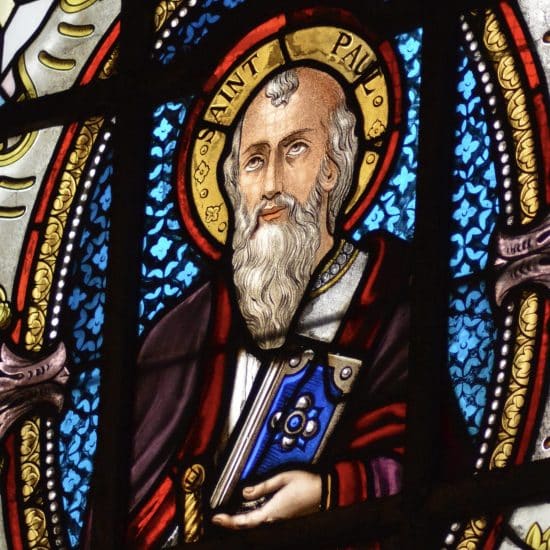
 Christ Crucified
Christ Crucified
Formations: January 19, 2020
Scripture: 1 Corinthians 2:1-13

Michael K Olmsted
Paul’s letters to the church in Corinth are shaped by his humility, his deep love for Christ, and his deep concern for a people he knew well who were living in a city of importance, wealth, and notorious immorality. Corinth was important because the Roman proconsul lived there, it was a major water crossroads for east-west commerce and north-south land trade connections, and because the greatest temple to Diana drew worshipers from across the Roman Empire. There were a thousand priestesses/prostitutes serving the cult of Diana. Indeed, the very name of the city had come to represent sexual immorality, that is, to “Corinthianize.”
Paul has been described by various scholars as unimpressive physically, as a tedious or hard-to-understand scholar, and as being shaped by his disciplines as a Pharisee. My opinion is that Paul was probably an ordinary man in appearance who deeply loved Christ and wanted, more than anything else, for the world to know the fullness of God’s grace. What I hear in the words of Paul is a longing for the world to know Christ and his vision, that the church become both passionate and gracious in its witness.
Note Paul’s description of himself to the Corinthian believers: “brothers and sisters, I did not come proclaiming the mystery of God to you in lofty words or wisdom. For I decided to know nothing among you except Jesus Christ, and him crucified. And I came to you in weakness and in fear and in much trembling” (vv. 3-4). He makes no claim of personal importance, but points to “God’s wisdom, secret and hidden, which God decreed before the ages for our glory” (v. 7).

Image by StockSnap from Pixabay
It is significant that Paul is not speaking as a Pharisee who knows the detailed interpretations of God’s law, nor is he trading on his respected position within the early church. Instead, he points to “things God has revealed to us through the Spirit” and “no one comprehends what is truly God’s except the Spirit of God” (vv. 10-11). Those words clearly put aside the interpretations of Jewish scholars in that day as well as the disruptive ideas of Gnosticism that were infiltrating the church.
It is most likely that Paul wrote this first letter to the Corinthian church from Ephesus on his third missionary journey. The church was influenced by the pagan culture of Corinth and by factions within who were devoted to other teachers such as Apollos and Peter. This does not mean either of those men were seeking position or power, but we know in our own day how individuals can dominate an individual church, ministry, or denomination.
Paul’s single driving passion was that the world could understand and accept God’s love in Christ. He could be very persuasive, but he knew because of his own conversion from legalistic religion to following Christ that God’s grace must never be supplanted by the world’s ideas of spiritual knowledge, or by the undue influence of individual personalities. Remember the crowds and notoriety that followed John the baptizer. Yet John described himself as not worthy to untie the sandals of Jesus (Matthew 3:11). When people questioned John about Jesus baptizing more people than John the colorful prophet said simply: “He must increase, but I must decrease” (John 3:30).
Importance, value, and standing have nothing to do with faith in Christ. We know from Paul’s writings that he was gifted and spread the gospel across the Roman world, yet he never demanded recognition of power for himself. Pride is a powerful corrupter in the world and in the church, but when it involves the gospel, pride must be surrendered at the foot of the cross or we negate the grace of God in the eyes of the world.
That idea of grace and love embodied by Christ must reshape how we think and live. Search the writings of Paul and you will find his favorite self-designation is as a servant of Christ, such as in Romans 1:11. His life and writings confirm that idea.
Last week we listened to Paul adeptly share the message of Christ with some of the most respected philosophers in Athens. He knew their culture and their beliefs, which enabled him to communicate and even convince a few. But to the divided and struggling church of Corinth Paul confronts the false ideas and immoral behavior of that city. The world may offer seductive and selfish promises, but there is a better way to live and there is a life shaped by God’s love, grace, forgiveness, and hope.
Christians must learn to think differently from the world, a world that too often shapes our values and actions. Learning religious creeds and joining religious groups will not change the human heart. We discover God’s love only in the cross. We live as God’s people only by the presence and power of God’s Spirit.
This is why Paul emphasized the wisdom of God. The world sees the cross of Christ as ugly and unnecessary, a brutal example of the first century world. But it is only in the cross of Christ that God stepped beyond eternity into the reality of our world to say “This is how much I love you!”
Christians are facing a challenging cultural shift in the United States, which is highlighted by our chaotic political climate. Power, wealth, and privilege have always been alluring, but modern media provides endless platforms supporting immorality, dishonesty, racism, and violence.
We are very much a modern Corinth. Paul is speaking to those of us who claim to be followers of Christ. As loudly as we may claim to be followers of Christ, our prejudices, selfishness, and divisive words communicate a faith that lacks love, compassion, and moral consistency. Consider what Paul writes about wisdom and the uncompromising demands of that wisdom in our personal lives if we desire to be witnesses for God’s grace.
This is the first month of the year 2020. Will Christ return this year to call his church home? No one knows. But whatever God’s timetable may be, there is one unarguable truth: every day is our opportunity to share the love of God by our words and actions.
Can you say as did Paul: “My speech and my proclamation were not with plausible words of wisdom but with a demonstration of the Spirit and of God’s power” (v. 4)? In 2 Corinthians 5:17 Paul reminds us: “So, if anyone is in Christ, there is a new creation: everything old has passed away; see, everything new has become new!” The crucified and resurrected Christ is God’s gift that can make you an example and voice of hope in this new year.
Formations is a curriculum series from Smyth & Helwys Publishing, Inc. through NextSunday Resources.
The PDF download requires the free Acrobat Reader program. It can be downloaded and installed at https://get.adobe.com/reader (uncheck optional offers first).



